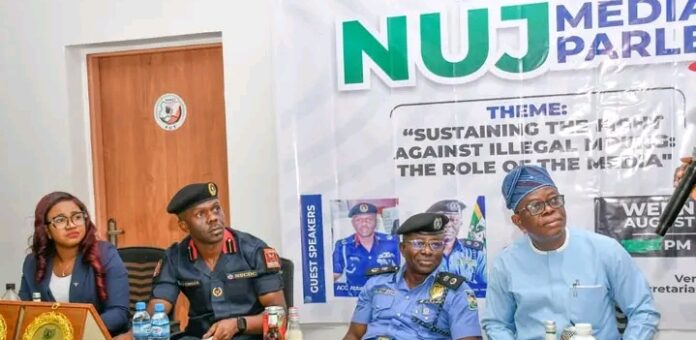Key players in Nigeria’s mining sector gathered in Abuja on Wednesday, pledging to work together against the rising problem of illegal mining.
The commitment was made during a one-day workshop organised by the Nigeria Union of Journalists (NUJ) FCT Council.
The workshop, themed “Sustaining the Fight Against Illegal Mining, The Role of the Media”, brought together security agencies, mining leaders, and journalists to discuss strategies for protecting the economy, the environment, and local communities.
Stakeholders, including the Nigeria Security and Civil Defence Corps (NSCDC) Mining Marshals, the police, and the Miners Association of Nigeria, stressed that collaboration is essential to stop illegal miners from looting the country’s natural resources.
Commander of the Mining Marshals, ACC A.J. Onoja, explained how illegal mining has cost Nigeria billions, damaged farmlands, and caused unrest in communities.
He emphasized that enforcement agencies cannot win the fight alone and called for a broad coalition involving government, industry, communities, and especially the media.
Onoja praised government efforts under President Bola Ahmed Tinubu, Minister of Solid Minerals Dr. Henry Dele Alake, Minister of Interior Olubunmi Tunji Ojo, and NSCDC Commandant General Prof. Ahmed Abubakar Audi, for establishing the Mining Marshals to clean up the sector. He noted that the unit operates under strict laws and a code of conduct to ensure fairness.
He revealed that the Marshals have dismantled illegal mining camps, arrested offenders, and supported government reforms in the mining sector.
However, he cautioned against attempts to discredit their work through biased media reports, urging journalists to be balanced and fair.
FCT Commissioner of Police, CP Ajao Adewale, described illegal mining as more than an economic crime, noting that it fuels insecurity, banditry, and kidnappings, with Nigeria losing an estimated $9 billion annually.
He highlighted hotspots such as Zamfara for gold, Nasarawa for lithium, and areas within the FCT like Gwagwalada and Kuje, where arrests have been made.
According to him, influential individuals often hide behind illegal mining activities, using foreign collaborators. He urged journalists to investigate money trails, share intelligence, and educate the public to help in the fight.
The National President of the Miners Association of Nigeria, Mr. Dele Ayanleke, explained that illegal mining includes operating without permits, using harmful chemicals, and exploiting child labour.
He warned of its damaging effects lost government revenue, polluted water, degraded land, and community conflicts.
Ayanleke urged the media to study mining laws for accurate reporting and to continue highlighting the issue.
He cited past tragedies such as lead poisoning in Zamfara that affected thousands of children and child labour in Nasarawa’s lithium mines as reminders of the dangers.
Earlier, NUJ FCT Chairman, Ms. Grace Ike, opened the event by stressing the media’s duty to serve as “gatekeepers of truth.” She described illegal mining as a threat to lives, the environment, and national security, urging journalists to investigate and educate without bias.
“As gatekeepers of truth and agents of accountability, our duty as journalists goes beyond reporting. We must investigate, expose, and educate the public on the devastating effects of illegal mining,” she said.
She promised that the NUJ would continue to amplify community voices and use digital platforms to spread awareness.



